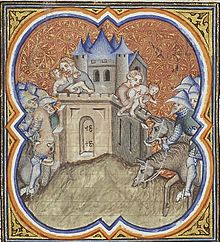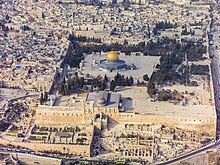This article is about the siege that occurred in 589–587 BC. It is not to be confused with the first siege by Nebuchadnezzar, see
Siege of Jerusalem (597 BC).
In 589 BC, Nebuchadnezzar II laid siege to Jerusalem, culminating in the destruction of the city and its temple in the summer of 587 or 586 BC.
Babylonian campaign and its outcome[edit]
Background[edit]
Following the siege of 597 BC, the Neo-Babylonian king Nebuchadnezzar installed Zedekiah as vassal king of Judah, at the age of 21. However, Zedekiah revolted against Babylon, and entered into an alliance with Pharaoh Hophra, the king of Egypt. Nebuchadnezzar responded by invading Judah (2 Kings 25:1).
Nebuchadnezzar began a siege of Jerusalem in December 589 BCE. During this siege, the duration of which was either 18 or 30 months (see below at "Chronological notes"),[1] the Bible describes the city as enduring horrible deprivation (2 Kings 25:3; Lamentations 4:4, 5, 9). After completion of the eleventh year of Zedekiah's reign (Jeremiah 1:3), Nebuchadnezzar broke through Jerusalem's walls, conquering the city. Zedekiah and his followers attempted to escape but were captured on the plains of Jericho and taken to Riblah. There, after seeing his sons killed, Zedekiah was blinded, bound, and taken captive to Babylon (2 Kings 25:1–7; 2 Chronicles 36:12; Jeremiah 32:4–5; 34:2–3; 39:1–7; 52:4–11), where he remained a prisoner until his death.
Aftermath[edit]
After the fall of Jerusalem, the Babylonian general Nebuzaraddan was sent to complete its destruction. Jerusalem was plundered, and Solomon's Temple was destroyed. Most of the elite were taken into captivity in Babylon. The city was razed to the ground. Only a few people were permitted to remain to tend to the land (Jeremiah 52:16).
The Jew Gedaliah was made governor of the remnant of Judah, the Yehud Province, with a Chaldean guard stationed at Mizpah (2 Kings 25:22–24; Jeremiah 40:6–8). The Bible reports that, on hearing this news, Jews who had fled to Moab, Ammon, Edom, and in other countries returned to Judah (Jeremiah 40:11–12). Gedaliah was assassinated by Ishmael son of Nethaniah two months later, and the population that had remained and those who had returned then fled to Egypt for safety (2 Kings 25:25–26, Jeremiah 43:5–7). In Egypt, they settled in Migdol (it is uncertain where the Bible is referring to here, probably somewhere in the Nile Delta), Tahpanhes, Memphis (called Noph), and Pathros in the vicinity of Thebes (Jeremiah 44:1).
Chronological notes[edit]
There has been some debate as to when Nebuchadnezzar's second siege of Jerusalem took place. There is no dispute that Jerusalem fell the second time in the summer month of Tammuz (Jeremiah 52:6), but William F. Albright dates the end of Zedekiah's reign and the fall of Jerusalem to 587 BC, but Edwin R. Thiele offers 586 BC.[2]
Thiele's reckoning is based on the presentation of Zedekiah's reign on an accession basis, which he asserts was occasionally used for the kings of Judah. In that case, the year that Zedekiah came to the throne would be his zeroth year; his first full year would be 597/596 BC, and his eleventh year, the year that Jerusalem fell, would be 587/586 BC. Since Judah's regnal years were counted from Tishri in autumn, that would place the end of his reign and the capture of Jerusalem in the summer of 586 BC.[2][3]
The Nebuchadnezzar Chronicle (BM 21946), published in 1956, indicates that Nebuchadnezzar captured Jerusalem the first time putting an end to the reign of Jehoaichin, on 2 Adar (16 March) 597 BC, in Nebuchadnezzar's seventh year.[4] Jeremiah 52:28-29 gives the relative periods for the end of the two sieges as Nebuchadnezzar's seventh and eighteenth years, respectively. (The same periods are elsewhere described at 2 Kings 24:12 2 Kings 25:8 as Nebuchadnezzar's eighth and nineteenth years, including his accession year.) Identification of Nebuchadnezzar's eighteenth year for the end of the siege places the event in the summer of 587 BC.


